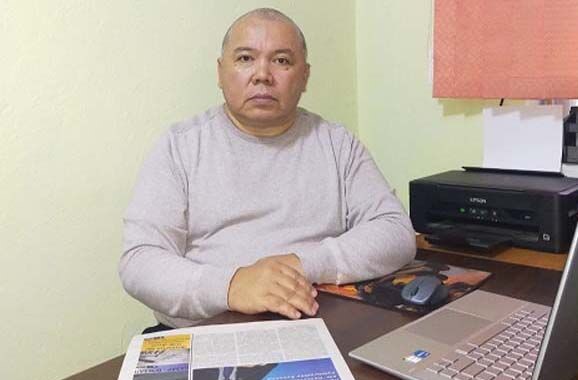Stockholm, July 10, 2023—Kazakhstan authorities should release journalist Amangeldy Batyrbekov and reform the country’s laws to remove prison sentences for defamation, the Committee to Protect Journalists said Monday.
On July 3, the Saryagash District Specialized Administrative Court in Kazakhstan’s southern Turkestan region sentenced Batyrbekov, chief editor of local independent newspaper S-Inform, to 20 days’ administrative detention over a March 10 Facebook post accusing a parliamentary deputy of corruption. He was taken from the courtroom to begin his sentence.
Batyrbekov denied the charges and said he plans to appeal the verdict.
In a statement, the local free speech group Adil Soz described the ruling as “unlawful,” saying the court failed to prove Batyrbekov had knowingly spread false information.
In 2019, Batyrbekov was sentenced to two years and three months on insult and defamation charges. In January 2022, he survived an assassination attempt allegedly organized by a local official in retaliation for his reporting.
“The 20-day prison sentence for Kazakh journalist Amangeldy Batyrbekov, who has been frequently targeted with defamation charges and even attempted murder for his reporting, is deeply troubling,” said CPJ Europe and Central Asia Program Coordinator Gulnoza Said, in London. “Kazakh authorities should free Batyrbekov immediately and reform their defamation laws to ensure that journalists are not jailed for their reporting.”
In the March 10 post, Batyrbekov alleged that parliamentary deputy Bolatbek Nazhmetdinuly was connected to corruption cases, pointing to a 2019 fraud case in which Batyrbekov said Nazhmetdinuly was allegedly a suspect and that police had “mysteriously closed.”
In court, Batyrbekov showed what he said was a signed police document identifying Nazhmetdinuly as a suspect, according to Adil Soz. However, the investigator whose signature was purportedly on that document told the court that he denied signing it, saying Nazhmetdinuly was a witness and not a suspect.
Nazhmetdinuly told CPJ by email that his lawyer contacted Batyrbekov in the comments section under that post and asked him not to spread inaccurate information and to delete the post. When Batyrbekov refused to take down the post, Nazhmetdinuly filed a defamation complaint on March 15, he said.
Nazhmetdinuly told CPJ that investigators in the March 15 defamation case provided Batyrbekov with a document stating that the parliamentarian had not been a suspect in that case.
Judge Berik Kaipov ruled Batyrbekov had spread information without checking its accuracy, and that simply fining the journalist would be “insufficient” punishment, according to Adil Soz.
A person close to the journalist told CPJ that Batyrbekov believed authorities had falsified the document to favor Nazhmetdinuly’s description of the case.
That person, who spoke to CPJ on the condition of anonymity, citing fear of reprisal, said Batyrbekov had frequently written posts and articles critical of Kaipov and that the judge had twice previously convicted the journalist of defamation. Those rulings were later overturned by higher courts, that person said.
CPJ’s calls and messages to Batyrbekov’s lawyer and email to the Saryagash Specialized Administrative Court went unanswered.
In 2020, Kazakhstan decriminalized defamation but maintained punishments of up to 30 days’ detention for the offense in its administrative code.
